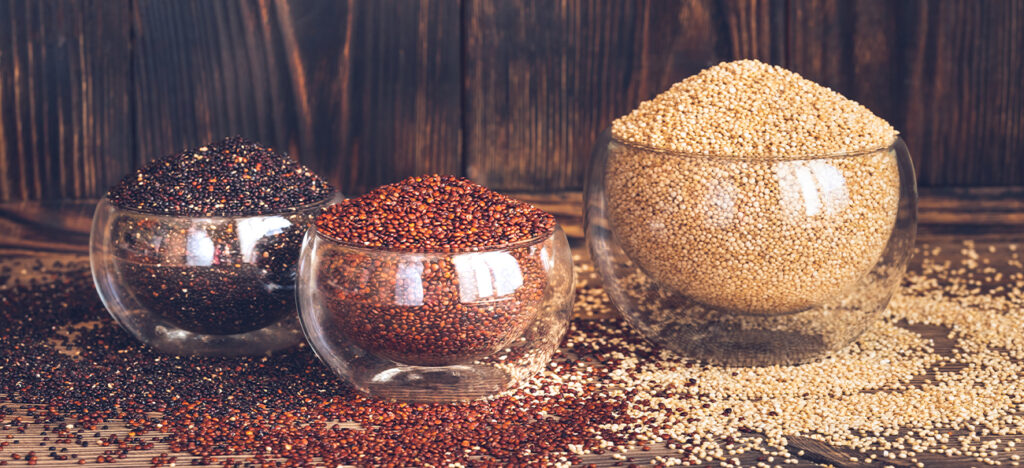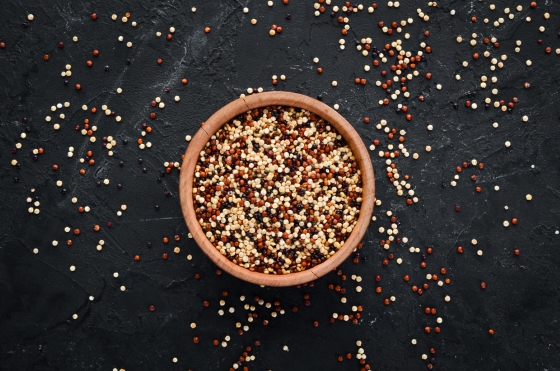In the world of superfoods, quinoa (pronounced keen-wah) stands tall. Once considered the “gold of the Incas,” quinoa has grown in global popularity due to its exceptional nutritional profile and versatility in cooking. Whether you’re plant-based, gluten-free, or simply health-conscious, quinoa offers a host of health benefits that make it worth adding to your plate.
Let’s dive into why quinoa deserves a spot in your pantry—especially as a complete protein and high-fiber food.
🌾 What Is Quinoa?
Quinoa is a pseudo-cereal—technically a seed, but consumed like a grain. It comes from the plant Chenopodium quinoa, native to the Andes Mountains of South America. There are over 120 varieties, but the most common types are white, red, and black quinoa.
Unlike most plant-based foods, quinoa is a complete protein, meaning it contains all nine essential amino acids that your body can’t produce on its own.
💪 1. Complete Plant-Based Protein
One of quinoa’s biggest nutritional claims to fame is that it’s a complete protein. A 1-cup serving (cooked) provides about 8 grams of high-quality protein—excellent for vegetarians, vegans, and anyone cutting back on meat.
Protein is essential for:
- Muscle repair and maintenance
- Hormone production
- Immune function
- Energy and satiety
This makes quinoa a valuable protein source, especially when paired with a balanced diet.
🌿 2. High in Dietary Fiber
Quinoa is rich in dietary fiber, offering around 5 grams per cooked cup—more than white rice or most other grains. Fiber supports:
- Healthy digestion and regular bowel movements
- Blood sugar control, preventing spikes and crashes
- Heart health by lowering LDL (“bad”) cholesterol
- Weight management, by promoting a sense of fullness
Adding quinoa to meals can help you stay satisfied longer and reduce cravings.
🛡️ 3. Packed with Nutrients
Quinoa is a nutrient-dense food, offering:
- Magnesium (for muscle and nerve function)
- Iron (for oxygen transport)
- Zinc (for immunity and healing)
- Folate (important for pregnant women)
- B vitamins, manganese, and phosphorus
And it’s naturally gluten-free, making it ideal for people with celiac disease or gluten sensitivity.
❤️ 4. Antioxidant-Rich and Anti-Inflammatory
Quinoa contains powerful plant antioxidants, including quercetin and kaempferol, which have been shown to have anti-inflammatory, antiviral, and anti-cancer properties. These compounds help fight oxidative stress and support long-term health.
⚡ 5. Supports Metabolic and Heart Health
Thanks to its mix of fiber, protein, and healthy fats, quinoa may:
- Help lower blood sugar
- Improve cholesterol levels
- Support weight loss or maintenance
- Reduce risk of type 2 diabetes and heart disease
Its low glycemic index means it won’t spike your blood sugar, making it a smart carb choice for people with diabetes or insulin resistance.
🍴 How to Use Quinoa
Quinoa is extremely versatile and easy to prepare:
- Use it instead of rice in bowls or stir-fries.
- Add it to salads for extra protein.
- Blend into veggie burgers or soups.
- Make sweet quinoa porridge with fruit and cinnamon.
Pro tip: Always rinse quinoa before cooking to remove its natural bitter coating, called saponin.

Quinoa is more than a trendy health food—it’s a nutritional powerhouse that delivers complete protein, dietary fiber, and essential nutrients in every bite. Whether you’re looking to fuel workouts, improve digestion, or balance blood sugar, quinoa fits the bill.
Simple to cook, endlessly versatile, and deeply nourishing—quinoa deserves a place on your plate.

